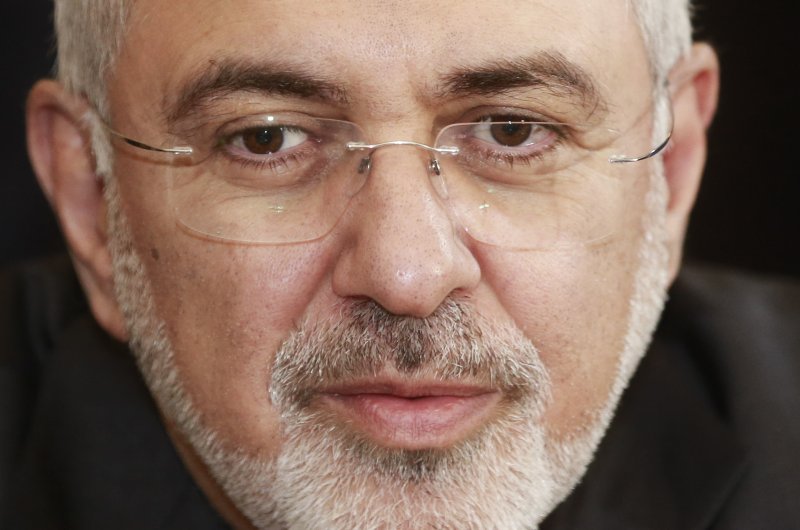Iranian Foreign Minister Jawad Zarif resigned his position, then later withdrew it. File Photo by Olivier Hoslet/EPA-EFE
March 5 (UPI) -- Facing Jawad Zarif's resignation, Israeli Prime Minister Benjamin Netanyahu commented "good riddance." U.S. Secretary of State Mike Pompeo described Iran's foreign minister as a frontman for a corrupt religious mafia and wondered whether his resignation will stick. Actually, confirming Pompeo's doubts, it did not stick. After receiving a memo from the supreme leader in which Zarif was urged for the "interest of the regime" to withdraw his resignation, the latter complied.
Those hoping for a high-level defection at the heart of the Iranian regime got disappointed as the disagreement was quickly mended at the request of the supreme leader. What was the motive behind this swift resignation? Was it an impulsive reaction, an expression of pride following Syrian President Bashar al-Assad's meeting with Iranian President Hassan Rouhani?
Zarif was kept aside from the meeting. Though the government said that the foreign minister's absence was due to an administrative lack of coordination, some sources say that Assad did not want Zarif to be present.
The resignation could also be a tactic Zarif used to prove to the regime that he has the upper hand and to show his superiors his value. At the end, Zarif is the civilized face of the Islamic republic with the Western world. Regardless of his ideological aspirations, it is obvious that Zarif's main concern has been to engage Iran with the world, namely the West. Zarif's main achievement in foreign policy is the Joint Comprehensive Plan Of Action. Now that the United States has withdrawn from the agreement, Zarif is struggling to prevent the JCPOA from unraveling.
One of his main tasks is to keep Iran's trade flow with Europe. This is why he is working with European countries on special payment vehicles to circumvent the sanctions that are targeting the financial system in Iran. To facilitate trade, Zarif is also trying to push Iran to register with the Financial Action Task Force, which is an intergovernmental regulatory body designed to insure transparency of financial transactions and to combat money laundering and terrorist funding.
On this, Zarif is finding resistance internally from the hard-liners, as it will limit their ability to launder money and to finance their proxies in the region. This is not the first instance when members of the regime antagonized Zarif. At the height of the negotiations for the JCPOA, while Iran should have done its best to show good intentions, it chose to show prowess. Iranians insisted on continuing the missile testing, which is a direct breach of United Nations resolutions. They captured 10 American sailors whose boat had drifted into Iranian waters. A video was released by the revolutionary guards featuring the sailors on their knees while an official bragged that Americans humbly admitted "Iranian might and power."
As today, hard-liners are emerging as the winning bloc in Iran and as Qassim Soleimani is gaining increasing popularity, can Zarif use this step to give the reformist agenda a boost? Will he be able to keep Iran engagement with the West, despite American sanctions? Will Zarif be able to play the role Deng Xiaoping played in modernizing China in the 1980s?
Following the disastrous ideology-driven policies of Mao Zedong in China, the country plunged into horrible poverty. Den Xiaoping, his successor, took a different approach. He implemented economic reforms, allowed trade and welcomed foreign investments while taking a setback on the communist ideology and its support for the Soviet Union foreign policy. His motto was "Hide your strength, bide your time."
Will Zarif persuade Iran to hide its "might and power" for the time being and focus on development? Will Zarif persuade the Iranian leadership to take a softer stance on foreign policy in order to leave room for domestic growth? Since the time of Ruhollah Khomeini, the supreme leader's main mantra has been to denounce foreign intervention and influence. Trade and foreign investments could be viewed as the tentacles of Western influence in Iran. However, Zarif can always give China as an example. Chinese communism outlived the Soviet Union. China was able to keep its political system, despite the economic liberalization of the country. Though it is a hard sell to the supreme leader, the current economic situation is no longer sustainable.
The coming period, the possible registration of Iran with the Financial Action Task Force and the success of the special payment vehicle with the Europeans can determine whether Zarif has the potential to become the Deng Xiaoping of Iran or not.
Dania Koleilat Khatib is an affiliated scholar at the Issam Fares Institute for Public Policy and International Affairs at the American University of Beirut. She specializes in U.S.-Arab relations and researches sectarianism, extremism and governance. Her book "The Arab Lobby and the U.S.: Factors for Success and Failure" was published by Routledge UK and translated to Arabic.















